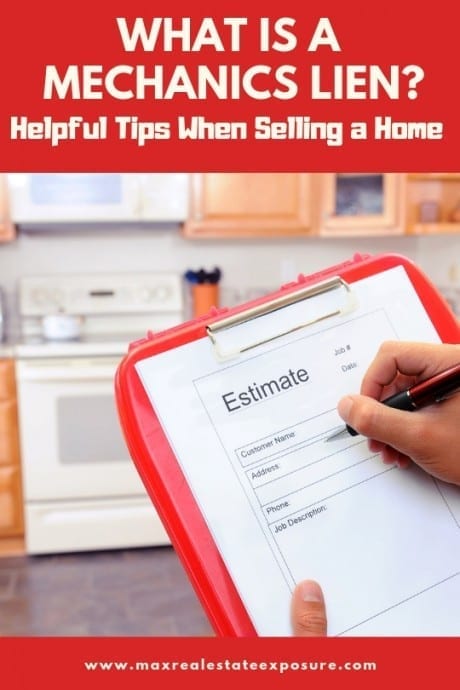 Did you find out there are liens on your house? Selling a home with a lien can be problematic.
Did you find out there are liens on your house? Selling a home with a lien can be problematic.
Can a lien against your property stop the sale? It sure can – dead in its tracks!
If you plan on selling your home, it is in your best interest to learn about property liens—what they are, how they can affect your sale, and whether your property has any claims against it.
Too many homeowners start the sales process without considering property liens and hit roadblocks to their sales.
Liens on a property are legal claims by an individual or other entity to ensure debt payment. Liens can be attached to several assets, including houses.
There are two significant types of property liens. They are voluntary and involuntary.
An example of a voluntary lien is one you requested, such as a mortgage against your home. A mortgage loan is the most common form of property lien.
Involuntary liens are placed against a home when you owe a debt, such as a mechanics or IRS tax lien.
A contractor lien is a common type of lien on houses. If contractors perform work at your home and you don’t pay them as agreed, they can attach a lien to your house.
Let’s examine this more closely.
What Are Liens on a House?
Liens against property are typical in real estate. Over the years, a few buyers have asked what a lien on a house is.
Property liens are legal notices attached to a title due to unpaid debts. It gives the unpaid party a legal claim to a portion of the property’s value. Liens can impact the ability to sell or refinance until they are resolved.
In other words, a lien is a recorded claim requiring you to pay the money you owe before selling your property.
Another way of thinking about a lien is an encumbrance of the home. A blemish on the title must be corrected before the sale occurs.
When you want to sell a home quickly, neglecting to deal with a house lien is a significant mistake for a home seller.
Who Can Put a Lien on Your House?
You might be wondering who can put a lien on your home. A house lien can be recorded by any creditor to which you owe money. Here are some examples you should be familiar with:
- Government for Unpaid Taxes: Both local and federal governments can place tax liens on your property for unpaid real estate or income taxes. These are called tax liens. Unfortunately, I have experienced a few clients who have fallen behind on their property taxes over the years. In the last economic downturn, I also worked with several homeowners on a short sale and owed the IRS back taxes.
- Contractors for Unpaid Work: If you have had work done on your home and fail to pay the contractor, they can file a mechanic’s or a contractor’s lien on your property.
- Creditors through Legal Judgments: If a court rules that you owe money to someone (a creditor) and fail to pay, the creditor can file a judgment lien against you. This can happen in unpaid credit card debt, personal loans, or other debts. I also have experienced these cases in short sales where the owner has run into financial challenges.
- Mortgage Lenders: This one is standard. When you take out a mortgage to purchase, the lender places a lien on your property as security for the loan. This is a voluntary lien, part of all mortgage agreements. This type of lien ensures the lender can foreclose on your home if you fail to make your mortgage payments.
Recommendations
I highly recommend you resolve any liens on your property. They can prevent you from selling or refinancing your home. If you don’t know whether there are any, you can search your local county clerk’s or recorder’s office, as they are public records.
Here is a complete explanation of how to search for property liens.
What Happens When a Lien is Placed on Your Home?
You will be notified when a lien is placed against your house. The method to inform you usually includes the mail, publication in local or government records, and recording with the local registry.
In the case of mechanic’s or contractor’s liens, they are usually required to send an initial notice to the homeowner informing them of the unpaid debt.
It ensures the lien becomes part of the public record, which is crucial for enforcing the lienholder’s rights.
Can a Family Member Put a Lien on My House?
Yes. For example, if you have not paid alimony or child support, a spouse could go to court and have a lien recorded against the house, ensuring payment.
In cases where you’re selling a house in divorce, it’s not uncommon for one spouse to get a lien against the other.
What Happens if There is a Lien on A House That is Not Mine?
It is possible in real estate sales to discover a lien on your house from a previous owner. Sometimes, property liens that were supposed to be discharged never get recorded.
When this happens, real estate attorneys must contact the previous owner’s lawyer to record the release correctly.
Is There a Statute of Limitations?
The statute of limitations for property liens varies by the state in which you are located. For example, in Massachusetts, a lien on a house will remain for up to twenty years, even if the property changes hands.
You will need to check the statute of limitation for your state.
Can You Sell a House With a Lien?
Yes. You can sell a house with a lien in some circumstances. For example, when you have a mortgage, the funds from the sale will be used to pay back the mortgage lender.
The circumstances are different when there is an involuntary lien. For the closing to occur, the debtor must be paid. The owner could pay off the debt, or the potential buyer could agree to pay it.
Sometimes, a real estate attorney or a lien negotiator will get the amount of the lien reduced. I had this happen on numerous occasions when representing short sellers. The lawyer I used would negotiate some of the debtor’s money owed.
The most problematic liens when selling a house are property tax assessments and income taxes owed to the IRS. You cannot sell your home unless you agree.
Avoiding liens on a house is crucial to have a smooth sale.Click To TweetHow to Sell a House With a Lien?
To sell a home, you must deal with the lien or liens. A seller has a few options, including paying off the liens in full, negotiating the liens with the creditors, having the buyer pay them, or taking legal action against them if the liens are unjustified.
How to Find Out If There is a Lien on Your Home?
Whether you are a buyer or seller, you can find out if there are liens on a house. You would conduct a property lien search to see whether any liens exist.
Discovering if there is a lien on a property can be easy. A house lien must be recorded publicly. You can search for property liens online and in person.
Performing a lien search is straightforward, whether you use real estate public records online, check local assessors’ records, or check the county register of deeds.
It would help if you had the owner’s name and address so you could complete your lien search. You can also visit the registry or assessor’s office in person. Finding out who owns a property is not challenging in most circumstances.
You can even get the complete history of a property if you like. A real estate attorney can assist if you prefer not to do a property lien search alone.
What Are The Different Types of Liens Against a House?
A lien can be claimed against your property in many ways. Some of these include the following:
Property Liens
A property lien is the most common type of encumbrance homeowners deal with. When you take out a mortgage to buy your home, the lender will always put a lien on the property. The lender expects you to pay off your mortgage before selling the property, which makes sense.
In a standard home sale where the owner has a mortgage, the lender is the first party paid from the money delivered by the buyer.
After the mortgage debt is addressed, the owner keeps the rest of the payment (except for some costs).
After a sale, the attorney representing the lender is supposed to discharge the mortgage. Over the many years I have been selling real estate, I’ve seen many occasions where a lawyer has not done their job and released the mortgage,
Guess what happens? If you think this comes up in a title search, you would be 100 percent correct. A title search is performed by a title company or an attorney representing the lender.
The attorneys involved in the current sale are left to clean up the mess when liens are discovered.</p>
For you
r sale to proceed, the mortgage lien needs to be discharged.
The property lien the lender has on your home also allows them to move forward with foreclosure and the seizure of the property if you stop paying your mortgage.
When selling a house, it is also important to disclose if you know there is a property lien that could prevent the sale from happening. A myriad of things discussed in the previous reference should be disclosed.
Anything that could prevent a home sale should be disclosed upfront.
Mechanics Lien
 A mechanics lien is another type of lien that contractors will use to get their payment.
A mechanics lien is another type of lien that contractors will use to get their payment.
Let’s say you decide to put on an addition to your home or finish the basement and hire a general contractor to do the work.
During the construction, you decided that the new bathroom did not come out as you expected. You are displeased because it’s not what you thought you would get.
You decide to withhold payment, but the contractor disagrees. They hear rumors that you have been transferred to another state and will be selling your home.
To protect their interests, they file a mechanics lien recorded at the local registry of deeds.
The claim prevents you from selling the home until they get paid or a resolution is agreed upon.
Another situation that could occur is finding out the contractor you hired never pulled building permits for the work, which is a good reason to withhold payment.
This is why getting lien waivers is crucial when contractors work on your home. The contractor waives their right to file a mechanics lien by getting signed lien waivers.
It is usually easiest to work out a deal with the contractor rather than wait for them to file the lien or try to take you to court.
Even if you do not go to court, having the lien on record will halt your home sale until you resolve the debt and have the lien removed.
Uniform Commercial Code 1 Lien
When you are a co-op owner, the lender will have a different type of lien on your property. This lien gives the lender the same rights as a property lien.
The lender can prevent the sale of your property until the debt is paid and can initiate foreclosure if the mortgage payments stop coming in.
UCC-1 filings can be done for specific assets, such as commercial property or equipment. They can also be a blanket lien covering the borrower’s assets.
Divorce
 A divorce lien will not prevent a house sale. It is one of the few situations where the lien is intentional and part of the home sale process. With a divorce lien, one party keeps the house, and the other gets a note and mortgage secured by the property.
A divorce lien will not prevent a house sale. It is one of the few situations where the lien is intentional and part of the home sale process. With a divorce lien, one party keeps the house, and the other gets a note and mortgage secured by the property.
In other words, one gets the real estate, and the other gets the paper.
This is undoubtedly an option that can come up when selling a house while getting divorced.
In this situation, the spouse who keeps the home has the same familiar environment for them and the children.
The children don’t have to change schools, and there are no divorce relocation costs. Moving is always expensive.
The spouse living in the home retains a fair share of the equity, hoping the house price will rise. The departing spouse is obligated to pay according to an agreed-upon schedule.
The agreement would be the divorce lien. The ins and outs of a divorce lien are spelled out in great detail in this outstanding article from Family Lawyer Magazine.
Homeowners Association
If you are part of a homeowners association or condominium association and become delinquent with your monthly or yearly dues, the association can put a lien on your property.
This type of lien is referred to as a homeowners association lien.
Nearly all homeowners associations can place a lien on the homeowner’s property if the homeowner becomes delinquent in paying the monthly fees and any special assessments.
When an HOA homeowner becomes delinquent on the assessments, a lien will typically automatically attach to that owner’s property, usually when the assessments are due.
In some cases, the HOA will record a lien with the local registry of deeds to provide public notice that the encumbrance exists, regardless of whether recording it is required. It would help if you always understood what you are getting into when buying where a homeowners association exists.</p>
IRS
The IRS also has the power to place a lien on your property if you fail to pay your taxes. Like all liens, it is designed to force you to pay the debt before you can sell your property.
The lien will include the taxes you owe and the penalties and interest accrued.
These kinds of liens can come from more than just income taxes, including school, sales, estate, payroll, and any other type of tax you might owe.</p>
When selling a house, you don’t want this kind of lien on your property!
Home Equity Line of Credit
Many homeowners are unaware that taking out a second mortgage or a home equity line of credit can result in a lien against their house. Failing to pay what you owe can cause the lender to foreclose on your property.
These are very common liens against a property. When you sell your house, they are paid off at closing. This is not the kind of lien a homeowner should worry about.
Tickets (Parking, Etc.)
Another big surprise can come from a lien due to violations like parking tickets. Failure to pay your parking tickets or tickets for moving violations can lead to a lien on your property.
These claims do not typically result in foreclosure proceedings, but they can still cause a hiccup in the sale when they are found through a title search.
You must pay the tickets out of your proceeds for the sale to go through.
Judgment Lien
A lost lawsuit is another event that can result in a lien being placed on your home. You must pay the debt owed for the lawsuit before you can sell the property. Legal action, of course, can happen for any number of reasons.
See what you need to know about judgment liens in this excellent resource from NOLO.
Property Taxes
 Most people pay their property taxes, but there are situations where these payments get missed in the shuffle.
Most people pay their property taxes, but there are situations where these payments get missed in the shuffle.
One common reason is that homeowners are used to the lender paying the property taxes as part of the escrow process but then find themselves responsible for the taxes once they pay off their mortgage.
It is easy to miss payments when you are not used to paying them.
Another way could be fighting a high property tax</a> and conveniently forgetting to pay – A little wink and nod.
The municipality where you pay property taxes can sell a tax lien to another party that can try to enforce the debt.
<p>The third-party may push to have you pay the property tax debt, or it may sell the lien to yet another party.
Regardless of who has the lien, if you try to sell your home without addressing the debt, then you will run into problems.
Contractor
Many homeowners sign agreements with home contractors without reading the fine print. Sometimes, these agreements include a section that gives the contractor the right to place a lien on the property if the contractor is not paid in full.
A contractor lien is just another description for a mechanics lien.
Things get more complicated in these situations because contractors usually don’t hold on to the lien. Instead of trying to get the money from you, they will sell the lien to get their money immediately.
That leads to a third party collecting your debt and complications with your home sale.
Credit Card
Having credit card debt is incredibly common, but fortunately, credit card companies cannot put a lien on your home unless they go through a lot of trouble to do so.
To get a lien, they must first have a court decide a judgment against you.
Creditors can place a lien on your home if you agree to it initially, such as giving the creditor written authorization when you try to get a loan.
Over my thirty-eight years selling real estate, surprisingly, I have seen some credit liens.
When short sales were in vogue, I would do many of these transactions representing sellers who needed financial assistance.
While going through the process, quite a few of these sellers had run up some credit card debt. The attorney I worked with would have to negotiate a settlement in these circumstances.
Environmental Control Board Violations
Yes, it is possible to have a lien placed on your home if you fail to meet the requirements of your local environmental control board—like if you do not fix a potential hazard they have identified, or possibly even if you don’t clean up your property to meet the board’s standards.
This type of lien is far less common but worth mentioning nonetheless.
You Can Get Liens On a House Removed
If you have a lien on your home and need to remove it, you can do it. The process of getting a lien removed is relatively simple.
You have to pay the debt that leads to the lien. Once you have paid the debt, you must get a “letter of satisfaction” from the party that filed the lien.
You need to take the letter to your local county clerk and ask for the lien to be removed. You will also want to make copies of the letter and ensure that the three major credit reporting agencies get a copy.
If you have no interest in doing this kind of work, hire a local real estate attorney dealing with lien removal.
You May Also Be Able to Make a Deal With Property Liens
While it may seem simple enough to pay a debt and remove a lien, some debts are too big to pay—or you disagree that you should have to pay them.
When you find yourself in this situation, try talking with the party that filed the lien and see if you can make a deal.
Many will agree to remove a lien if you agree to payments or to pay part of the debt.
Sometimes, you can’t get blood out of a stone. Many savvy creditors realize this after doing some research. If that is the situation, you could pay pennies on the dollar to resolve the liens.
The Homestead Protection Act Protects Homeowners
An encumbrance against property is a claim by an individual or entity that speaks to justify specific rights. In Massachusetts, the Homestead Act is a form of protection that most attorneys recommend for home closings.
The Massachusetts Declaration of Homestead is a form of insurance that protects the equity in your property for up to $500,000 if a lawsuit is filed against you.
So, if you are sued, $500,000 of the equity in your home could not be touched by an attachment or lien and subsequent levy on the execution of the sale.
The Homestead Act protects you from creditors who want to get at your equity to repay the debts you owe them.
If you don’t have a homestead declaration, creditors with a lien against your property can foreclose. They can auction your house to collect the money you owe them.
This isn’t to say because you have homestead protection, you should willfully try to screw someone out of money. Far from it! I mention homestead protection because it is one of the best insurance policies for buying a house.
Conclusion
Hopefully, you have enjoyed the advice on how to deal with a lien when selling your home. It is highly advisable in situations such as these to hire a qualified real estate attorney.
About the Author: Bill Gassett, a nationally recognized leader in his field, provides information on what liens are on a property and whether they stop house sales. He is an expert in mortgages, financing, moving, home improvement, and general real estate.
Learn more about Bill Gassett and the publications in which he has been featured. Bill can be reached via email at billgassett@remaxexec.com or by phone at 508-625-0191. Bill has helped people move in and out of Metrowest towns for the last 38+ years.
Are you thinking of selling your home? I am passionate about real estate and love sharing my marketing expertise!
I service Real Estate Sales in the following Metrowest MA towns: Ashland, Bellingham, Douglas, Framingham, Franklin, Grafton, Holliston, Hopkinton, Hopedale, Medway, Mendon, Milford, Millbury, Millville, Natick, Northborough, Northbridge, Shrewsbury, Southborough, Sutton, Wayland, Westborough, Whitinsville, Worcester, Upton, and Uxbridge MA.

